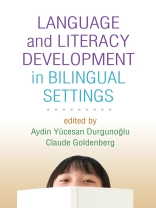Grounded in state-of-the-art research, this book explores how English language learners develop both the oral language and literacy skills necessary for school success. Chapters examine the cognitive bases of English acquisition, and how the process is different for children from alphabetic (such as Spanish) and nonalphabetic (such as Chinese) language backgrounds. The book addresses a key challenge facing educators and clinicians: identifying students whose poor English skills may indicate an underlying impairment, as opposed to still-developing language proficiency. Implications for diagnosis, intervention, and instruction are highlighted throughout.
विषयसूची
I. Introduction
1. Contexts for Language and Literacy Development among Dual-Language Learners,
Claude Goldenberg, Leslie Reese, and
Ali Rezaei
II. Oral Language and Dual-Language Learners
2. The Role of First Language on Oral Language Development in English: The Case of Both Alphabetic and Nonalphabetic Languages,
Stefka H. Marinova-Todd and
Yuuko Uchikoshi
3. Tuning in to Language-Specific Patterns: Nonword Repetition and the Big Picture of Bilingual Vocabulary Learning,
María R. Brea-Spahn and
Elaine R. Silliman
4. Rapid Spoken Language Shift in Early Second Language Learning: The Role of Peers and Effects on the First Language,
D. Kimbrough Oller, Linda Jarmulowicz, Barbara Z. Pearson, and
Alan B. Cobo-Lewis
5. Language Proficiency and Its Implications for Monolingual and Bilingual Children,
Ellen Bialystok and
Xiaojia Feng
III. Literacy and Dual-Language Learners
6. Factors Affecting the Relative Relationships between First- and Second-Language Phonological Awareness and Second Language Reading,
Alexandra Gottardo, Yan Gu, Julie Mueller, Iuliana Baciu, and
Ana Laura Pauchulo
7. Learning a Nonalphabetic Script and Its Impact on Later Development of English as a Second Language,
Him Cheung, Catherine Mc Bride-Chang, and
Xiuli Tong
8. Chinese Language Learners of English Use More Orthographic–Lexical Than Phonological Strategies in English Word Recognition and Spelling,
Che
Kan
Leong
9. Writing Acquisition among English Language Learners in U.S. Schools,
Laura Méndez Barletta, Janette K. Klingner, and
Michael J. Orosco
IV. Assessment and Diagnosis
10. Linguistic and Cognitive Processes in the Development of Spelling in English Language Learners: First-Language Transfer, Language Proficiency, or Cognitive Processes?,
Esther Geva and
Adèle Lafrance
11. Cognitive and Oral Language Contributors to Reading Disabilities in Spanish–English Bilinguals
, Franklin R. Manis and
Kim A. Lindsey
12. Assessment of Literacy Problems among English Language Learners Based on the Component Model,
R. Malatesha Joshi and
P. G. Aaron
V. Conclusion
13. The Policy Context of Research on Basic Processes in Bilingual Children in the United States,
Kenji Hakuta
लेखक के बारे में
Aydin Yücesan Durgunoglu, Ph D, is Professor of Psychology at the University of Minnesota Duluth. She has worked as a high school teacher and as a college instructor of English as a foreign language. Her research addresses child literacy development in different languages as well as in bilingual contexts, adult literacy, and English literacy development of recent immigrants to the United States. Since 1995, as a consultant for the Mother Child Education Foundation in Istanbul, Dr. Durgunoglu has led the efforts to create an innovative adult literacy program in Turkey, which has now reached about 100, 000 individuals across the country. Claude Goldenberg, Ph D, is the Nomellini & Olivier Professor of Education in the Graduate School of Education at Stanford University. A native of Argentina, he conducts research on promoting academic achievement among language minority students. He is a recipient of the Albert J. Harris Award from the International Literacy Association and the Best Research Award from Learning Forward. He currently directs a randomized control trial in Rwanda evaluating an early literacy intervention created by Save the Children.












